|
|
|
Sort Order |
|
|
|
Items / Page
|
|
|
|
|
|
|
| Srl | Item |
| 1 |
ID:
190987
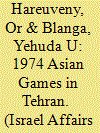

|
|
|
|
|
| Summary/Abstract |
As a close ally of Shah Muhammad Reza Pahlavi, Israel participated in the September 1974 Asian Games – the ‘Asian Olympics’ – that were held in Tehran. Among the 18 sports in which athletes competed, football attracted the most attention, especially after Iran’s historic victory over Israel in the AFC Asian Cup in 1968. As both countries reached the final of the Games’ football tournament, the match came to be seen by Iranians as nothing short of war. Standing in stark contradiction to the close and multifaceted relations between Jerusalem and the monarchical regime, this public attitude was lost on Israeli decisionmakers in what foreshadowed the failure to anticipate the Islamic revolution and the attendant collapse of Iranian-Israeli relations five years later.
|
|
|
|
|
|
|
|
|
|
|
|
|
|
|
|
| 2 |
ID:
190993
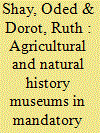

|
|
|
|
|
| Summary/Abstract |
The establishment of agricultural and natural history museums in Jerusalem (1920) and Tel Aviv (1925) by individual and institutional Jewish entrepreneurs was a corollary of the wave of exhibitions and fairs in Western countries that swept across Mandatory Palestine’s Jewish community (Yishuv) in the 1920s. Yet it also reflected Zionist ideals and perceptions and as such served as a catalyst for providing modern agricultural education to the Yishuv’s urban classes.
|
|
|
|
|
|
|
|
|
|
|
|
|
|
|
|
| 3 |
ID:
190990
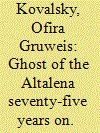

|
|
|
|
|
| Summary/Abstract |
The tragic Altalena incident of June 1948, where prime minister and minister of defence David Ben-Gurion ordered the newly-formed Israel Defence Forces (IDF) to sink a ship laden with arms for one of Israel’s pre-state military underground groups, killing sixteen people and wounding many others, remains one of the most traumatic events in Israel’s history. This article re-examines the conduct of the key personalities involved in the incident and their attitude towards it in subsequent years.
|
|
|
|
|
|
|
|
|
|
|
|
|
|
|
|
| 4 |
ID:
190986
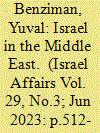

|
|
|
|
|
| Summary/Abstract |
During its 75 years of existence, Israel’s strategies vis-à-vis its neighbours have alternated drastically in accordance with the vicissitudes in regional and global affairs: from reliance on force, to a status quo approach, to combining ‘land-for-peace’ approach while participating in ‘new wars’, to peace initiation, to unilateral action, to improved relations with the Arab world while trying to avoid the Palestinian issue. This article describes the evolution of these strategies, discusses their origin and underlying assumptions, and assesses their future implications.
|
|
|
|
|
|
|
|
|
|
|
|
|
|
|
|
| 5 |
ID:
190983


|
|
|
|
|
| Summary/Abstract |
Israel’s relations with the Arab world underwent dramatic changes during its seventy-five years of existence – from hostility and enmity to peacemaking and reconciliation. This development is the result of the strengthening of Israel’s regional and international position on the one hand, and the weakening of the Arab world and the Arab states’ withdrawal into themselves in the face of the socioeconomic problems confronting them, on the other. And while the regional fear of Iran’s hegemonic drive has played an important role in the evolution of Israeli-Arab cooperation, the potential for consolidation of the nascent relationship goes well beyond the Iranian threat as both sides share weighty political, security and economic interests such as fighting radical Islam, promoting regional stability and security, and ensuring economic prosperity. Yet while the Palestinian issue didn’t prevent the consolidation of Arab-Israeli relations, it remains the lowest common denominator for Arab public opinion in its search for identity and meaning. As such, it will continue to threaten regional stability and the building of Israel’s relations with its Arab partners.
|
|
|
|
|
|
|
|
|
|
|
|
|
|
|
|
| 6 |
ID:
190997
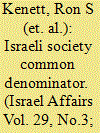

|
|
|
|
|
| Summary/Abstract |
The core of this article is the search for an ‘organizing principle’ for the State of Israel in the present era. To approach this core goal, it conducted 40 interviews with well-known and influential Israeli individuals and attempted to identify common grounds of Israeli society. Analysis of the interviews finds a broad common denominator among those with a wide variety of opinions, which is closely linked with the major principles of the Declaration of Independence of the State of Israel.
|
|
|
|
|
|
|
|
|
|
|
|
|
|
|
|
| 7 |
ID:
190995


|
|
|
|
|
| Summary/Abstract |
This article re-examines Jewish population in what is now Israel using historical estimates from Ottoman, Mandatory British and United Nations sources and recent data from the Israeli census bureau. A logistic model generates backward extrapolations and forward projections. The model quantifies three waves of Jewish immigration totalling about 3.5 million. Subtracting immigrant data from total population numbers gives the main empirical trajectory for non-immigrant native-born population. A multi-logistic model combining migrant and native populations projects a Jewish population of about 10 million in 2050, a level low in the range of estimates made by others.
|
|
|
|
|
|
|
|
|
|
|
|
|
|
|
|
| 8 |
ID:
190989
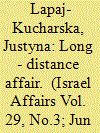

|
|
|
|
|
| Summary/Abstract |
Australia played an important role in the acceptance of the November 1947 UN Partition Resolution underpinning the establishment of the State of Israel, recognising the nascent Jewish state in January 1949 and presiding over its admission to the UN four months later. In subsequent decades, the two states have developed a close and warm relationship (albeit not without the odd political disagreement) and multifaceted political, economic, technological, and strategic collaboration. This article explores the nature and characteristics of this relationship as it evolved the past seven decades in an attempt to determine its underlying causes and most important driving forces.
|
|
|
|
|
|
|
|
|
|
|
|
|
|
|
|
| 9 |
ID:
190985
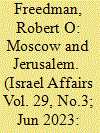

|
|
|
|
|
| Summary/Abstract |
Relations between Moscow and Jerusalem have seen numerous ups and downs since the birth of Israel in 1948. Two main issues have dominated the relationship. The first is security, with the Soviet Union, then the Russian Federation providing diplomatic support and military aid to Israel’s enemies, especially, in recent years, to Iran and Syria. The second issue is the freedom of Jewish emigration to Israel. Finally, since the advent of Vladimir Putin, Israel has been very much the junior partner in the relationship giving Russia much more than it has received in return.
|
|
|
|
|
|
|
|
|
|
|
|
|
|
|
|
| 10 |
ID:
191000
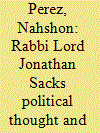

|
|
|
|
|
| Summary/Abstract |
An internationally renowned scholar and theologian, Rabbi Lord Jonathan Sacks (1948–2020), longstanding Chief Rabbi of the United Hebrew Congregations of the Commonwealth (1991–2013), suggested a direct discussion of the State of Israel. By way of exploring the way he viewed the modern State of Israel, this article discusses Rabbi Sacks’ overall communitarian, covenant based ideas before focusing on three categories: national narrative, the invigoration of civil society, and the place of religion. His most distinct criticism relates to the interrelationship between religion, the political system, and the state, illustrated inter alia by his insistence that ‘Judaism must be depoliticised and put back where it belongs, in civil society, far removed from all structures of power’.
|
|
|
|
|
|
|
|
|
|
|
|
|
|
|
|
| 11 |
ID:
190998


|
|
|
|
|
| Summary/Abstract |
Teachers avoid controversial issues due to lack of knowledge and fear of being sanctioned. This article proposes a new theoretical perspective that views this phenomenon as a part of the neoliberal discourse. Interviewing 70 teachers suggests that whenever they were requested to discuss a controversial issue, they mostly individualised it while ignoring its social-political-civic contexts. These practices might indicate that the education system in Israel does not fulfill its educational duty, particularly in an age where many democracies are under threat. We recommend to re-include socially-oriented sociology in the field of education.
|
|
|
|
|
|
|
|
|
|
|
|
|
|
|
|
| 12 |
ID:
190988
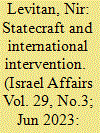

|
|
|
|
|
| Summary/Abstract |
The nature of the relationship between statecraft and third-party interventions is complex and remains an issue that has not been fully explored in the academic literature. Experience shows that the two often interact, at times creating harmonious coordination, at times exacerbating tensions. These actions and reactions were present for Israel after the War of Independence as it worked to form an effective approach to the UN and its peacekeeping forces that were created to supervise implementation of the 1949 Arab-Israeli armistice agreements. This article examines how Israel strove to develop its own foreign policy statecraft strategies and to protect its national and strategic interests in the early 1960s, while contending with the involvement of UNTSO under the activist leadership of Swedish Maj. Gen. Carl Von Horn.
|
|
|
|
|
|
|
|
|
|
|
|
|
|
|
|
| 13 |
ID:
190991
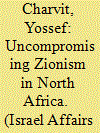

|
|
|
|
|
| Summary/Abstract |
In July 1950, Moroccan Rabbi Yahya Ben Harosh wrote a letter to his students chastising those exposed to ultraOrthodox anti-Zionist influences for disparaging and denigrating Zionist leaders and the founders of the State of Israel. This article discusses the historical background to the letter, including the ideological foundation of the rabbi’s vigorous protest: from his position regarding the messianic concept to the religious affirmation of Zionism as a national-liberation movement. As such, Ben Harosh’s stimulating letter is not an isolated episode but a reflection of the longstanding religious and ideological antecedents of Zionism, dating back to the 16th century, which contained the main elements of the would-be Zionist endeavour. So much so that it is arguable that the 16th century set in motion a fundamental process worthy of being the departure point of Zionist historiography.
|
|
|
|
|
|
|
|
|
|
|
|
|
|
|
|
| 14 |
ID:
190984
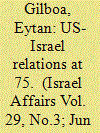

|
|
|
|
|
| Summary/Abstract |
This article examines American Israeli relations since the establishment of the state in 1948 to the present. It presents a combination of historical and theoretical analysis. It uses the concept of ‘special relationship’ to analyse major issues in the evolution of bilateral relations including US support for Israel’s independence, Arab-Israeli wars, Palestinian terrorism, mediation, peace agreements, foreign aid, public opinion, attitudes of American Jews and a look at the future. The article reveals strong strategic ties between the two allies but also cracks that threaten to damage the special relationship, including the loss of bipartisanship support, new strategic priorities in US foreign policy, political polarisation, distancing among American Jews, demographic changes, and effects of the 2023 judicial reform in Israel.
|
|
|
|
|
|
|
|
|
|
|
|
|
|
|
|
| 15 |
ID:
190992
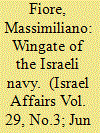

|
|
|
|
|
| Summary/Abstract |
This article tells the extraordinary story of Fiorenzo Capriotti, the man behind the sinking of the Egyptian flagship the Emir Farouk in October 1948 and the birth of the Israeli navy commando unit. Using the same unconventional technique that the Italian navy special assault unit Decima Flottiglia MAS had pioneered against the British in World War II, the embryonic Israeli navy was able to defeat Egypt’s superior numbers and weaponry. Not only did Capriotti play a key role in the founding of the Israeli navy commando unit, but he also made a significant contribution in shaping the doctrine that the Israeli navy should overcome the unfavourable balance of power through the superiority of its naval commando units. The sinking of Emir Farouk in fact consolidated the notion that the Israeli navy should compensate for its small size relative to most of its enemies through greater agility and firepower.
|
|
|
|
|
|
|
|
|
|
|
|
|
|
|
|
|
|
|
|
|